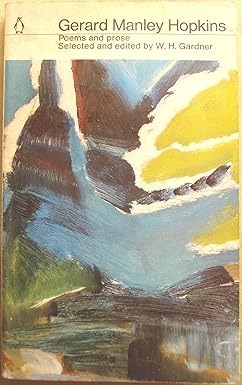

Steve Whitaker, Features Writer
Poem Of The Week: God's Grandeur By Gerard Manley Hopkins (1844-1889)
God's Grandeur
The world is charged with the grandeur of God.
It will flame out, like shining from shook foil;
It gathers to a greatness, like the ooze of oil
Crushed. Why do men then now not reck his rod?
Generations have trod, have trod, have trod;
And all is seared with trade; bleared, smeared with toil;
And wears man's smudge and shares man's smell: the soil
Is bare now, nor can foot feel, being shod.
And for all this, nature is never spent;
There lives the dearest freshness deep down things;
And though the last lights off the black West went
Oh, morning, at the brown brink eastward, springs -
Because the Holy Ghost over the bent
World broods with warm breast and with ah! bright wings.
The world is charged with the grandeur of God.
It will flame out, like shining from shook foil;
It gathers to a greatness, like the ooze of oil
Crushed. Why do men then now not reck his rod?
Generations have trod, have trod, have trod;
And all is seared with trade; bleared, smeared with toil;
And wears man's smudge and shares man's smell: the soil
Is bare now, nor can foot feel, being shod.
And for all this, nature is never spent;
There lives the dearest freshness deep down things;
And though the last lights off the black West went
Oh, morning, at the brown brink eastward, springs -
Because the Holy Ghost over the bent
World broods with warm breast and with ah! bright wings.

The power we now recognise in Hopkins’ words would have been, if not anathema to his contemporaries, then certainly a departure from contemporary norms, conceived in a startlingly new language whose faltering rhythms, reversals and enforced pauses mirror, most closely, that sense of spellbound immediacy by which the narrator is overtaken. Hopkins’ apprehension and his resistless compulsion to translate what he beholds into new forms, is a foreshadowing of Modernism.
The Jesuit priest whose relationship with God, and God in nature, gives definition to all he sees, renders the inexpressible in figures of shimmering gold, the ‘shining from shook foil’ a brilliant and sibilant metaphor for the shedding of pure light. The second half of the opening octet tarnishes the gold, as Hopkins considers the drudgery of the human condition. The slow trudge of the repeated ‘have trod’ is enacted on a treadmill of the incarcerated imagination in thrall to ‘trade’ and commerce, whose ‘bleared, smeared’ vista might be espied through a thick industrial fog, and stands in moribund counterpoint to the silent ministry of the Divine. The nurturing breast of the Holy Ghost brooding over this Blakean landscape with protective wings offers a glimpse of the sun through the murk